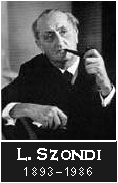INVESTIGATION PRISONERS
The following short survey was written by Ida Maria Mello Schivitz. She lives in Brasilia. For more information you can contact her at the following address: schivitz@cpovo.net
Your editor
S U M M A R Y
The main purpose of this study is to be a dissertation survey in order to conclude the Postgraduate Course in Criminal Science as university specialization for the Law College, in the Penal Science Department of the Federal University of Rio Grande do Sul.
As a Psychologist, the intention was to survey the literature, through several sciences and its authors, such as Law, Philosophy, Sociology, Anthropology, and Psychology, and their contributions for the Criminology.
In the sequence, the field investigation is explained, which is divided in three psychological studies done with convicts from the First Police Office Prison, of the Justice and Security Public Secretariat of Rio Grande do Sul State.
“The Convicts Psychological Profile” is the first study and presents the result of a personality evaluation done with 300 prisoners from a population between 700 and 800 detainees, by using the “Szondi Trieb” projective test.
In the first place (14,3%) is the ego type (k - p -) which Szondi calls “Projective Negation” or “I Drill”, disciplined person, and adjusted to the environment, but who has an inherent load of depression;
In the second place (11%) is the ego type (k - p +) called “Inhibited Ego” by Szondi, also depressed, and generator of fears.
In the third place (10%) is the ego type (k - p 0) with total negation, depression, inhibition or “Neurotic Ego”.
In the fourth place there are two pictures: Ego (k 0 p -) or “Paranoid Ego” (8.7%), and Ego (k + p -), typical of rough, and primitive people (8.7%). The other psychological types found are in a place under 50%, so they can be considered as a minor significance.
As follows, “The verification of the relation between the personality and the crime of the convicted author, and the personality and the crime found by Szondi presents the validation attempt of Szondi’s theory for the population mentioned.
But, during the survey of the ego typology of the crimes of the convicts, while elaborating the quantitative comparison with the ego typology, and the ego typology crimes found by Szondi, it was seen the difference between the Brazilian criminal legislation and the one presented by Szondi In order to get round this deadlock, the analysis by percentage was used, not being possible to apply the X2 Test. So, a taxonomy was proposed to analyze the ego types of the convicts and the Penal Titles*, as well the ego types of the convicts and the Penal Types*, connecting to what was mentioned by Szondi.
Only in the Title II of the Brazilian Penal Code there was 13% of types of ego; the other 15% types of ego are 10% below. Then, due to the difference in legislation, it can not be said scientifically that the presented by Szondi be valid for he population studied in the First Police Office Prison.
“The relation between the ego typology of the convicted authors and the ones not convicted” is the result of the third study, where a random sample of “70 convicts” is being considered out of a 300 population, and the X2 Test was applied to verify the correlation with “70 not convict” or people never arrested.
Then, it is possible to reject H 0, in other words, “there is a relevant difference between the two groups studied, convicts and not convicts, both overall and also in some specifics types”. Regarding the specific types of ego it is possible to say:
There is a higher trend that convicts are from the 5 Type, or narcissistics, psychopaths;
From 6 Type or I Drill, adjusted;
And from 11 Type, or presenting more depersonalization than the ones not convicts.
Finally is presented an overall conclusion considering the survey done.
* TN: The Brazilian Law Code is presented in Titles and Type of Penalties.
|


















